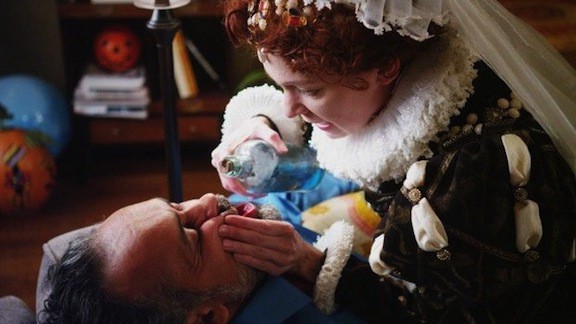My narrative feature, Vino Veritas, opens with a wife and husband arguing. Lauren, a former globe-trotting photojournalist and adventurer, expresses her extreme dissatisfaction with her current suburban family life to her spouse, who has acclimated to the world of SUVs and neatly mowed lawns far better than she.
When I shared an early rough cut with fellow filmmaker friends for input — writers, directors, and producers both male and female — the one recurring note I got centered on Lauren’s character. Comments ranged from the mild (“annoying” and “irrational”) to the increasingly offensive (“insufferable” and “c***.”)
One female producer wrote, “I would look to the greatest extent possible to make Lauren as likeable as possible… to soften her… tone her down…. She is so shrill that I worry people will just check out in the beginning and not care about what happens to her.”
I didn’t.
I am not naive or uninformed. I’m quite familiar with the current climate and its resistance to “difficult” female characters and the relative lack of female antiheroes. But I admit to being surprised that a scene I consider so mild would garner such visceral responses. I was even more startled to find filmmakers internalizing these tropes and self-censoring accordingly. They didn’t seem to be expressing what they actually felt about the work, but were instead trying to be protective of me based on feedback they’d gotten on their own projects.
In my experience from screening the film at festivals, audiences did not react to Lauren in the same way. One man looking to be in his late twenties approached me after a showing in Mexico to say she was the character he most related to, particularly in the opening fight scene. Several other men and women have approached me after viewings to say how much they related to her. They noted how real she sounds and feels. She voices their frustration, their pain. That recognition of “it’s not just me” and “I know exactly what she’s saying” is tremendously powerful to an audience, and it’s what makes this character’s journey in the film particularly compelling.
So I suggest we all stick to our guns and trust our instincts. Don’t compromise. It won’t always work, but I do believe the mass media has conditioned us to sell our audiences, both male and female, short. Humans are so much more than marketing demographics. The more we present men and women in all different forms, the more we depict and celebrate the entire spectrum of humankind, the more acceptable it will become to represent recognizable human beings in the media.
Let’s not run from our diversity and genuine humanity in some vague and ill-defined attempt to appeal to everyone all the time. Let’s push for a world where viewers can recognize virtually any human face regardless of gender, race or anything else, as their own.
Vino Veritas is Sarah Knight’s narrative feature debut. Gravitas Ventures will release the film on VOD and iTunes on January 15th. Sarah’s documentaries include Hot Flash, about the DC band Saffire — The Uppity Blues Women, and Diamonds are a Girl’s Best Friend, a portrait of the Head Groundskeeper for the Baltimore Orioles at Camden Yards and one of only two women to hold that position in Major League Baseball.







